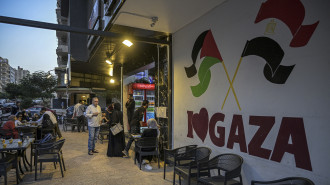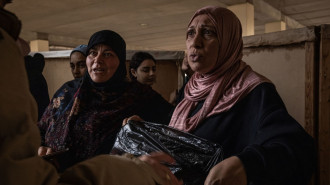![Demonstrators wearing a mask painted with the colours of the flag of East Turkestan hold placards reading "Speaking Turkish , banned" and "fasting in ramadan, banned" during a protest by supporters of the Uighur minority on April 1, 2021 at beyazid square in Istanbul [Getty Images]](/sites/default/files/styles/image_360x240/public/2021-12/GettyImages-1232053310.jpg?h=199d8c1f&itok=MfNqZkAA)
'Now they have nothing and are nobody': The deep wounds of Uyghur women torn from their homeland
![Demonstrators wearing a mask painted with the colours of the flag of East Turkestan hold placards reading "Speaking Turkish , banned" and "fasting in ramadan, banned" during a protest by supporters of the Uighur minority on April 1, 2021 at beyazid square in Istanbul [Getty Images]](/sites/default/files/styles/image_360x240/public/2021-12/GettyImages-1232053310.jpg?h=199d8c1f&itok=MfNqZkAA)
The most heart-breaking call Ainisa would ever receive was from her husband four years ago. He told her to move on with her life. She should forget him and make a new start with their family. The police were coming after him, he said, and he would not make it out. He gave her his blessing to meet someone else who could be a father for their children and a provider for her.
The atrocities in Xinjiang have left a trail of broken lives scattered throughout the world. Those Uyghurs and other Turkic minorities who managed to make it out have left spouses and children to an uncertain fate at the hands of the CCP, and wherever exiles gather the themes are grief and sadness, bitterness and rage.
Women have been left to pick up the burden of raising children without fathers or breadwinners, to cope with the pain of loss and to find a reason to carry on.
"Women bear the brunt of children’s pain and the bottled up anger of husbands who will not talk"
With all legitimate means of escape from Xinjiang blocked, Ainisa had paid $40,000 for the torturous 3,700-kilometre journey eastwards from her hometown on the farthest northwestern border of China. She made it to Vietnam, across deserts, along rivers and through dense forests with her four children under eight.
The traffickers had steered a group of more than one hundred split into several groups towards Cambodia and Thailand where they waited three months until their fake Turkish passports were ready. The tension had been unbearable. Keeping infants quiet in the small concrete-floored apartment room was vital to avoid curious neighbours and the police checks. The last leg was in sight. Malaysia beckoned and from there a flight to Istanbul.
The plan had been for her husband to join them in Turkey. But it was not to be. The last she heard via friends of friends, was that he had been sentenced to prison indefinitely. There had been no reason given.
Former journalist, Münevver Özuygur, herself an exile from Xinjiang (or East Turkestan as she prefers to call it) and a group of displaced Uyghur women, set up the Nuzugum Culture and Family Fund in 2013 in Istanbul, that was officially recognised by the Turkish government in 2018, to support the neediest in their community.
At first, they supported the 400 or so registered orphans and countless widows in Istanbul with a monthly grant, but the priority now is education and easing the psychological trauma faced by these women whose life is plagued by the past. "The longer they survive on handouts, the slower their recovery will be," she says. "For their own sake and that of the children they must come to terms with what has happened. They must build a future and find a reason to live," she says.
She has set up basic education classes for around 300 students from the ages of 6-20, many of whom have not studied in their homeland or whose education has been interrupted since their abrupt exile. Take-up has also been brisk for her first level psychology course from which eighty women have graduated and seventeen more have completed level two.
"They will never move on until they are helped with their own feelings," said Münevver, who has also been disturbed by the profound effect on many Uyghur children who are now de-facto orphans and of husbands who are estranged from the family in the homeland. "Women bear the brunt of children's pain and the bottled-up anger of husbands who will not talk," she said.
Cramped by a male Uyghur stereotype that bottles up emotions, men refuse to join her courses leaving it up to the women to field the acting out of their children and the depression and violence of their husbands. Those with spouses left behind are usually thrown together in second "marriages" and they carry the daily burden of guilt and longing for their children left behind to the mercy of the state and the CCP "orphanage programme."
Münevver's charity takes its name from an Uyghur folklore heroine who refused to bow to Manchu invaders and be married off to one of them. She was forced to walk from Kashgar to Ghulja over the mountains. (1,267 kilometres) wrapped in chains as a punishment. On arrival, still refusing the union she was killed and her body burned. Today's heroines are the widows far from home who pick themselves up and carry on, says Münevver. "Uyghur history is full of such people."
"The wounds are deep, and unique to Uyghur women... It will take a hundred years to heal their wounds. But we try our best to help and take one day at a time"
The tragedies Nuzugum deals with every day are heart-breaking. Firuz and his sister saw their parents swept away by a river whilst trying to escape overland through Thailand in 2014. Meriem and her brother were abandoned in Egypt when their parents were rounded up on the orders of Beijing and returned to Urumqi in July 2017. Muhtarem, a mother of five children was the wife of a rich Hotan businessman. They came to Turkey for business, bought a house and he used to travel back and forwards for work. Suddenly in 2016 while he was in the homeland police arrested him and five members of his family.
None have been heard from since. Muhtarem and her children have been left destitute and the uncertainty is crippling. Others left brothers and sisters behind when it became impossible to get a passport and most have left a father serving an indeterminate prison sentence in one of the camps set up by Beijing to “re-educate” them.
A new development for the community, says Münevver is the flight of scores of Uyghurs, who have made the first dangerous journey out of Xinjiang, are prepared to flee again to Europe leaving their womenfolk for the second time to seek a new life in Europe. They pick an international flight transiting in Europe, disembark halfway and hope for the best.
|
Unable or not wanting to stay in Turkey, fearful that it's incremental cosying up to China could find them repatriated on spurious, usually terrorism charges, they risk transiting through unsympathetic countries. As many as ten European member states have extradition agreements with China and many Uyghurs are prepared to play with fire in the hope they can arrive under the radar.
The women are left again to pick up the pieces while their husbands too are thrown into limbo in yet another foreign land. They are faced with the distressing questions of children who want their fathers back. Will a dollar bring my dad home? Asked a young boy the other day of his mother, says Münevver, whose courses equip women with the difficult task of facing and dealing with not only their own but also their children's pain.
They work through marital conflict and how to cope with teenagers who feel torn between their Uyghur culture and that of their adopted land. "They are strangers here," says Münevver. "That is difficult for kids who are forging an identity and long to be accepted." The problems are exacerbated when the children cannot accept their parents' "remarriage" when their own flesh and blood are languishing in a Chinese prison. "They are ripped apart," she says.
Many families who managed to escape while they still had passports were wealthy, she explains. They were bosses who had businesses, trades and professions. They had beautiful homes and status in Uyghur society. "Now they have nothing and are nobody," she says. Learning the language is difficult. They have no way to express their feelings, they feel inadequate in providing for their families and their wives usually bear the burden of the frustration that builds up. They also see their children losing touch with the culture, wanting to move on and resenting constant references to the homeland. "This hurts the parents terribly," she says, describing the tensions and offence this creates within the family.
"The wounds are deep and unique to Uyghur women," says Münevver. "It will take a hundred years to heal their wounds. But we try our best to help and take one day at a time."
The author is writing under a pseudonym to protect her identity
![Female members of the Uyghur community protest the extradition treaty signed by China and Turkey, which will undoubtedly increase safety concerns for those lucky enough to escape [Getty Images]](/sites/default/files/styles/medium_16_9/public/2021-12/GettyImages-1231593177.jpg?h=199d8c1f&itok=pzQO_0f5)
![Palestinians mourned the victims of an Israeli strike on Deir al-Balah [Getty]](/sites/default/files/styles/image_684x385/public/2024-11/GettyImages-2182362043.jpg?h=199d8c1f&itok=xSHZFbmc)


![The law could be enforced against teachers without prior notice [Getty]](/sites/default/files/styles/image_684x385/public/2178740715.jpeg?h=a5f2f23a&itok=hnqrCS4x)
 Follow the Middle East's top stories in English at The New Arab on Google News
Follow the Middle East's top stories in English at The New Arab on Google News


